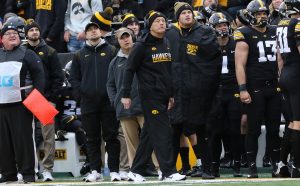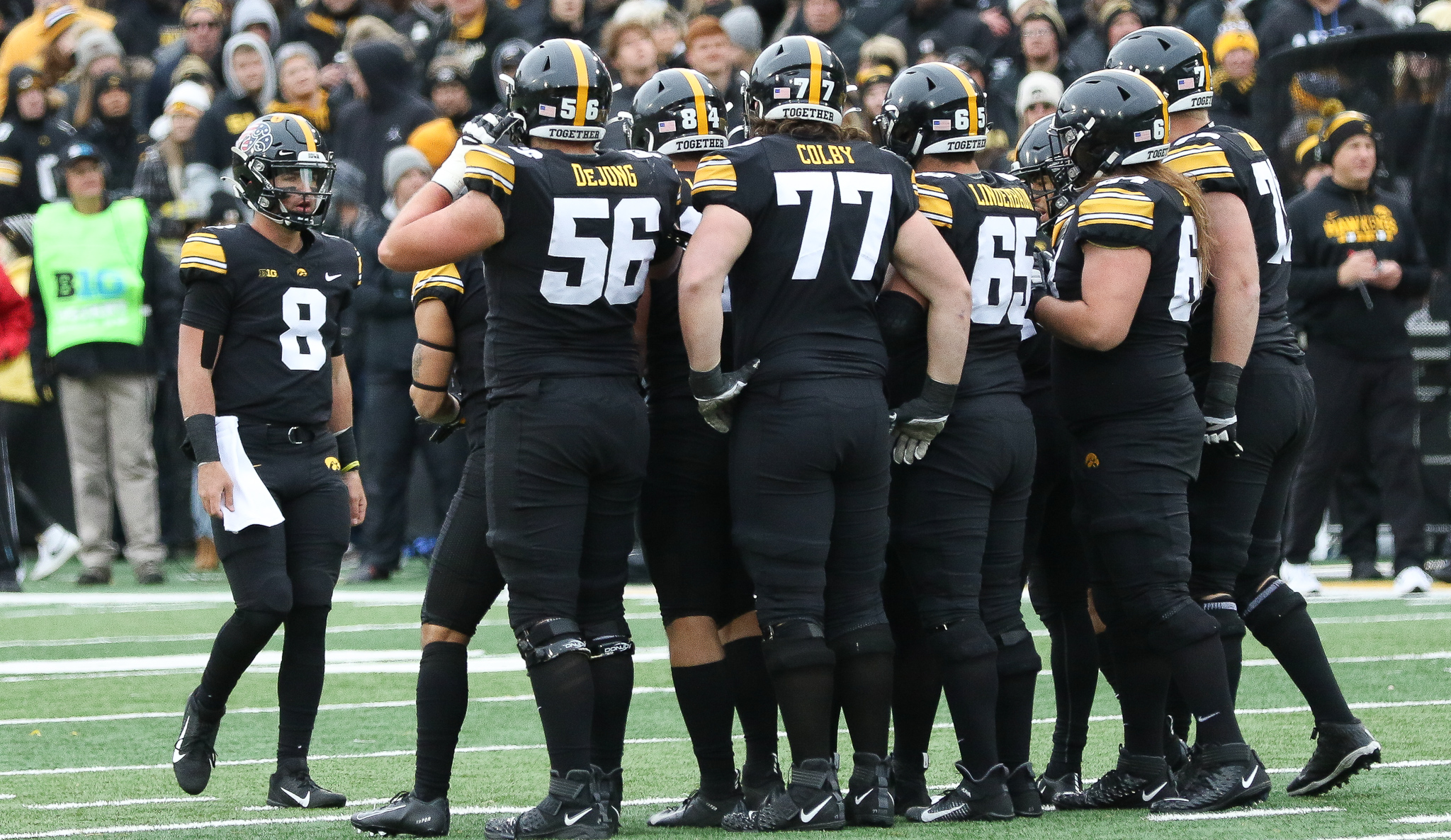Iowa’s biggest problem on offense is the play-not-to-lose mindset
By Pat Harty
IOWA CITY, Iowa – A victory over Nebraska on Friday would mark just the fourth time in 23 seasons under Kirk Ferentz that Iowa has won at least 10 games in the regular season.
The other three times were in 2002, 2009 and 2015.
The biggest difference between those teams and the current Iowa team is that they were far more successful on offense, and more enjoyable to watch because of that.
The 2002 team had a Who’s Who of Hawkeye stars on both offense and defense, a list that included Brad Banks, Robert Gallery, Fred Russell, Bob Sanders, Eric Steinbach, Maurice Brown and Dallas Clark just to name a few.
The 2009 team had Ricky Stanzi playing quarterback with a supporting cast that included running backs Adam Robinson and Brandon Wegher, receivers Derrell Johnson-Koulianos and Marvin McNutt and tight end Tony Moeaki
The 2015 team ran the table during the regular season, 12 straight wins and did so with C.J. Beathard leading the way at quarterback, and with Desmond King performing at a star level in the secondary.
The 2002 team won a share of the Big Ten title, while the 2015 squad won the Big Ten West Division, but then lost to Michigan State in the Big Ten Championship game.
The current Iowa team, on the other hand, hasn’t won anything of significance yet, although, winning nine of 11 games is significant, and a chance for a 10-win regular season is also significant.
“Ten games is pretty significant,” Kirk Ferentz said Tuesday. “So, if we could get to that and it would be better now in the regular season certainly, sooner the better.
“But it’s like a couple weeks ago you can’t get to ten without getting to seven or six or whatever so it’s kind of a week at a time. We always give them the big picture and get right back to what’s on tap here for this week.”
A victory over Nebraska on Friday, coupled with a Minnesota victory over Wisconsin on Saturday would make Iowa the Big Ten West Division champion.
It’s not beyond the imagination to see that happening, especially with Minnesota playing at home.
So, for Iowa to even be in this position is a worthy accomplishment, and yet, it seems hard for some fans to fully appreciate what has occurred this season because they’re so frustrated with the offense, and with how Iowa performed in the back-to-back losses to Purdue and Wisconsin by scores of 24-7 and 27-7, respectively.
When you’ve stayed in one place for as long as Kirk Ferentz has at Iowa, the margin for error shrinks, it becomes harder to avoid repeating yourself and expectations rise.
The current team still has a chance to win 11 games with a bowl victory, and yet, something still seems missing.
It’s hard to think of a season in which fans have complained more about a team that could ultimately be one of the winningest teams in program history.
But the source of the frustration seems obvious, and that would be Iowa’s ongoing struggles on offense.
We might look back at this team when it’s all said and done and wonder what it could’ve accomplished with just an average offense.
Because the defense is rock solid, and special teams are as good as they’ve ever been under Kirk Ferentz, and that’s saying a lot.
The offense under Kirk Ferentz almost always is a work in progress, sometimes a slow work in progress, but this season has been a crawl.
The combination of poor execution, conservative and predictable play calling and playing not to lose has caused the offense to sputter and made it hard to watch at times.

Throw in the fact that Kirk Ferentz’s son is the offensive coordinator and that creates an uneasiness that has festered throughout the season.
Most of the negative feedback this season has been directed at offensive coordinator Brian Ferentz and his play calling.
Regardless how you feel about Brian Ferentz’s play calling, the numbers speak for themselves.
Iowa is currently ranked last in the conference in total offense (293.18), 13th in yards per rush (3.12) 12th in rushing offense (115.27) and 10th in pass efficiency (115.8).
That pretty much covers it all, and shows why fans are so frustrated.
No matter how Iowa finishes this season, Kirk Ferentz should go into the offseason looking for ways to improve his offense.
This isn’t to say that Kirk Ferentz at the age of 66 should drop everything he believes in and start running a spread offense.
But something has to change because right now it seems that Brian Ferentz has little faith in his offense to make big plays, so he just tries to avoid making mistakes by calling plays that would be considered easy and safe.
Alex Padilla has started the last two games at quarterback and is expected to start against Nebraska on Friday.
But other than his ability to scramble and move the pocket, the offense pretty much looks the same as it did with Spencer Petras playing quarterback.
Iowa’s rushing attack has shown improvement during the month of November, but how much of that is due to the opponents?
Iowa’s inability to sustain a rushing attack has been the biggest problem on offense this season because so much of Iowa’s offense revolves around the running game.
Iowa has rushed for fewer than 100 yards in five games this season.

“When you can’t block consistently up front, it’s just hard, it’s really hard because you can only scheme so much,” Kirk Ferentz said. “It’s hard to move the ball without blocking. I guess that’s the bottom line, the way we do things.
“I think now at least we can think realistically we might have a chance to go on there and develop a little consistency. The thing I’ve been encouraged by, and I was optimistic about probably six weeks ago, I really felt like if guys could practice, we would see improvement, but then are they going to be able to practice because we had guys in and out seems like every other day. I think we’re gaining a little bit of traction here, but it will be another challenge this week. They’ve got some big guys on that front that are experienced.”
One theory for why Iowa struggles on the ground is that the zone blocking schemes that Kirk Ferentz still uses are outdated and easier to defend.
Critics also say that Kirk Ferentz is too stubborn and set in his ways to change.
The problem with that theory, however, is that Kirk Ferentz’s area of expertise is the offensive line, so wouldn’t he know if a scheme was outdated?
What needs to change more than the blocking scheme is the mentality on offense.
It often seems that Iowa plays more not to lose on offense than to win, and the coaches seem to have a mindset that being aggressive and taking chances is only asking for trouble.
That could all be traced back to Kirk Ferentz, because even with his son as the offensive coordinator, the offense is what Kirk Ferentz wants it to be.
This season has shown that Iowa has deep-rooted issues on the offense that have to be addressed.
Injuries have certainly been a problem, especially on the offensive line. But every teams has to deal with injuries.
Iowa’s problem on offense is as much or more mental than physical.
Iowa has some explosive weapons on offense, namely running back Tyler Goodson and freshmen receivers Keagan Johnson and Arland Bruce.
Junior Sam LaPorta is also one of the most productive tight ends in the conference.
So it would seem the pieces are there for Iowa to be more aggressive on offense.
Again, the problem has more to do with the mindset on offense.



